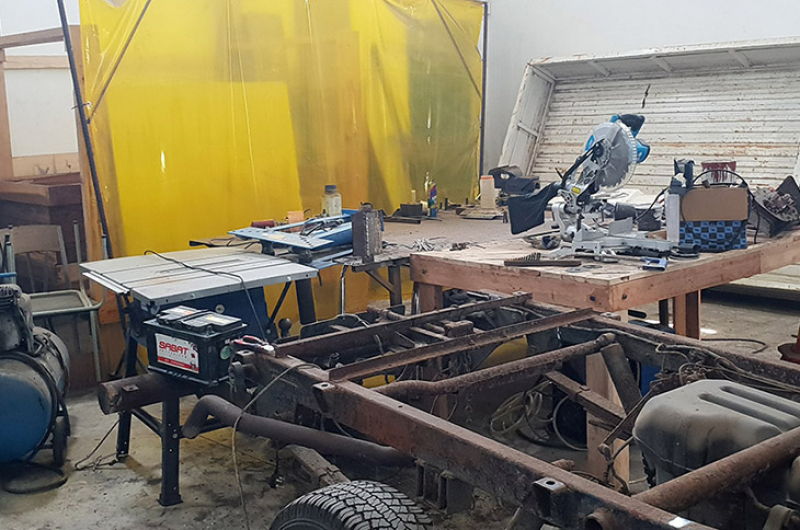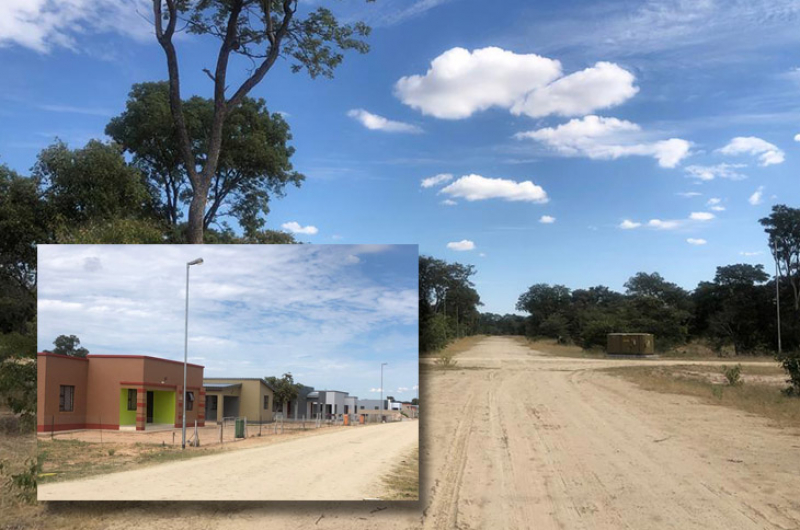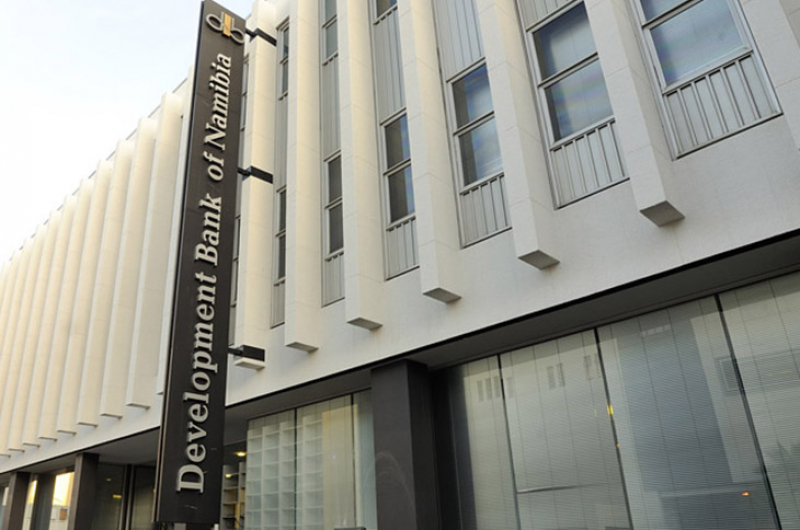 Call 061 290 8000
Call 061 290 8000 Click to mail us
Click to mail us FAQs
FAQs

DBN
The Development Bank of Namibia (DBN) facility for skills-based finance has provided finance to Muudhigu Investments CC. The company, operated by young artisan, Ndeenda Mbungu, offers welding services in Walvis Bay, Swakopmund and Arandis. Services include metal fabrication, pipe welding, tube brazing, cast iron welding and sheet metal welding.
Aged 28 at the time of application, Mbungu satisfied the requirements for young artisan finance with an NQF3-level certificate in metal fabrication from Okakarara Vocational Training Centre, as well as the necessary experience in full time employment prior to starting his own business.
He uses outsourced accounting services to assist him with management. In addition to his own employment in the company, his permanent workforce consists of a welder, a handyman and a general worker. Mbungu expects to employ temporary employees on a needs-basis as his business grows.
Mbungu and Muudhigu Investments represent the ideal borrower on many levels, says Jerome Mutumba, DBN Executive for Marketing and Corporate Communication.
There is a perception, Mutumba says, that an effective enterprise requires large amounts of capital at start-up. However, Muudhigu shows that with grit, determination and innovation, a business can be established with lean capital structures. In the case of youth enterprise, although expectations are often high, the reality is that larger loans often impose a significant debt burden on the young.
The high repayment can have the unintended effect of reducing profits to the enterprise and owner, which actually restricts financial growth and enterprise savings, counter to the intent and best-interest of the borrower.
In Muudhigu’s case, he continues, borrowing less and rationalising on assets and working capital has placed Mbungu in a better position to approach the future as his monthly repayments are lower.
On the topic of the enterprise environment, Mutumba says that Walvis Bay is a hub for industrialisation. Providing an artisanal skill such as welding enables multiple enterprises to make use of the skill. He notes that at the expert level that Mbungu has attained through certification and experience, various companies that might have competed to hire Mbungu can now share his expertise by contracting Muudhigu Investments.
Talking about the rationale behind the skills-based facilities for artisans and professionals, Mutumba emphasises that although Namibia needs to develop enterprise now, it also has to consider the future of economic activity.
Investments in youth and their empowerment as entrepreneurs are one of the best ways in which we can express our hope to expect more from the future, he concludes.
Development Bank of Namibia (DBN) has been instrumental in developing serviced land for a new community in Eenhana, the capital of Ohangwena Region. Established as a town in 1999, Eenhana is one of Namibia’s fastest growing towns, and serviced land is needed to ensure that the population can continue to grow while reaping the benefits of socioeconomic wellbeing.
Development of serviced land in Portion 5 of Eenhana was undertaken by a public private partnership consisting of Eenhana Town Council, a joint venture between developer Ino Investment Holdings and consulting engineers Lithon Project Consultants, and financier Development Bank of Namibia. The PPP was the first of its kind, and serves as a model for ongoing and future development of serviced land.
Speaking about the project, DBN CEO Martin Inkumbi says the requirements were complex and benefited from multifaceted expertise.
Among the works undertaken were establishment of gravel roads, sleeving for telecommunications infrastructure, water mains and connections to the erven, sewage reticulation, an underground electricity system and infrastructure to lead away stormwater. Following planning by Lithon Project Consultants the works were undertaken by Ino Investments using contractors.
Land was made available by Eenhana Town Council.
The project made provision for 151 residential erven on which 151 single houses can be built and eight general erven on which blocks of apartment units can be built. Two civic erven on which public spaces, playgrounds and / or sports grounds were provided for. One erf was allocated for business and another two were provided for government institutions.
On the topic of developmental qualities of the community, Inkumbi said that not only does the land have to be suitable for construction through a full range of services, but the entire community has to be planned to make it socially sustainable, hence the requirement for civic erven for recreation and business erven to allow for retail facilities and potential employment opportunities within the community.
The benefit for Eenhana, Inkumbi states, is that the town will be able to attract and keep residents, through the provision of better land and municipal services. This, in turn, makes the town more attractive to enterprises, which in turn will attract more residents. At the same time, Eenhana Town Council earns income from rates and taxes which enables it to maintain municipal services as well as service more land and grow the extent of the town.
Inkumbi expresses satisfaction and pride in the model and the learnings. The model is sustainable, the development benefits are clear and the finance is determined by sales. He concludes by opening the door to stakeholders from local authorities and developers to consult the Bank on means to facilitate serviced land.
Another N$130 million for development finance, funded by private investors
The Development Bank of Namibia (DBN) has issued a new bond, DBN29, with a face value of N$130 million. The 7-year bond was issued via private placement on 4 March 2022, and it matures on 5 March 2029.
DBN29 was issued with a spread of 240 basis points above the 3 month JIBAR, the Johannesburg Interbank Average Rate, meaning it will pay interest quarterly at 2.4% above the average rate at which banks buy and sell money. As the 3 month JIBAR is set quarterly, DBN29 is a floating rate bond and the interest rate will change every three months.
Payments of interest will be made quarterly in arrears, and the capital amount of N$130 million will be repaid on 5 March 2029, when the bond matures.
The bond is the Bank’s first sovereign guaranteed bond, so its repayment is guaranteed by the Government.
As bonds come with a high interest costs for use of investor funds, DBN bonds are used to raise funds to finance infrastructure and large enterprises. These categories have a lower risk of impairments and defaults.
SMEs have a higher risk of impairments and defaults, so they are financed from the Bank’s Development Portfolio (DP).
In total, DBN has issued five bonds, including DBN29, since it listed its medium-term note programme on the Namibian Stock Exchange (NSX) in 2017.
The programme falls within the twin mandate elements of the Bank to develop new, sustainable methods of investment and to enable the private sector to participate in funding of development.
The first bond, DBN20 was fully repaid at maturity at an amount of N$291 million issued. DBN20A1, an amortizing bond, has paid N$112 million and has N$28 million still in issue. DBN20B has repaid N$49 million and has N$21 million still in issue. DBN23 has repaid N$203 million and has N$87 million still in issue.
DBN20, DBN20A1, DBN20B and DBN23 redeem(ed) part of their capital amounts (subscriptions) plus interest every six months, unlike DBN29 which will pay interest quarterly, but will only repay the capital amount of N$130 million on 5 March 2029.
Currently, bond subscriptions are issued via private subscription to large institutional investors who wish to invest in DBN paper, while contributing to development. The Bank expects to hold an auction for public subscriptions which will be open to all qualifying investors. Bonds are denominated at N$1 million per bond with subscriptions allocated according to the interest rate at which investors are prepared to subscribe for the bonds.
DBN is rated by Fitch Ratings. The bank currently has a foreign currency long-term issuer default rating (IDR) of 'BB'/Outlook Negative and a national long-term IDR of 'AAA(zaf)' /Outlook Stable.





